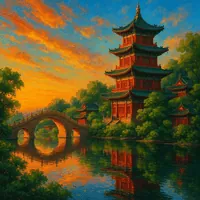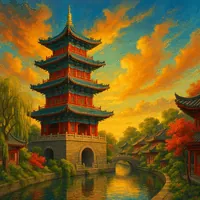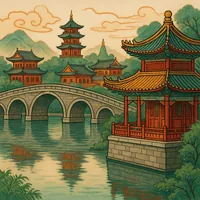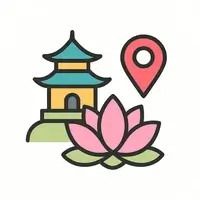


Cangzhou, China
Population: 7,300,783
Cangzhou, located in Hebei Province, China, distinguishes itself with the remarkable Iron Lion of Cangzhou, a towering cast iron sculpture dating back to 953 AD, revered as the oldest and largest of its kind. This ancient guardian stands as a testament to the city’s enduring metallurgical craftsmanship, a skill passed down through generations visible in Cangzhou’s vibrant, hand-forged kitchen knife industry. Moreover, Cangzhou is acclaimed as the Kung Fu town, renowned for its martial arts legacy, especially the practice of Baji Quan, deeply entwined with the city's cultural identity.













Notable points about Cangzhou
- Historical Significance: Cangzhou is renowned for its rich history, dating back over 2,000 years. It served as a crucial stop on the Grand Canal, which was a major transportation artery connecting Beijing and Hangzhou during imperial times.
- Martial Arts Heritage: The city is recognized as the birthplace of the Chinese martial art style known as Bajiquan. It attracts martial arts enthusiasts from around the world who are eager to learn and experience authentic Chinese martial arts culture.
- Iron Lion of Cangzhou: A key landmark in the city is the Iron Lion of Cangzhou, an ancient cast iron sculpture from the late 10th century. It is one of the largest and oldest cast iron monuments in the world, showcasing the city's craftsmanship and technological achievements of the era.
- Renowned Acrobatic Tradition: Cangzhou is also known for its traditional Chinese acrobatics. The city has produced many acclaimed acrobats who have gained both national and international recognition, making it a must-visit for those interested in performing arts.
- Unique Cultural Fusion: What sets Cangzhou apart from other Chinese cities is its blend of Han, Manchu, and Hui ethnic cultures. This cultural fusion is evident in its traditional festivals, cuisine, and architecture, offering a diverse cultural experience for visitors.
- Convenient Location for Travel: Situated near the Bohai Sea and well-connected via highways and railways, Cangzhou is ideal for single travelers looking for an accessible yet less touristy destination. Its proximity to Beijing and Tianjin makes it a convenient base for exploring Northern China.
- Romantic Waterways: Couples can enjoy romantic boat rides along Cangzhou’s waterways, particularly in the Baima Canal, which offer a serene escape amidst beautiful landscapes and historic surroundings.
- Kung Fu Schools for Families: Families with children can explore the city's numerous martial arts schools. Participating in a family-friendly Kung Fu class can be an exciting way to engage in physical activity while learning about local culture and discipline.
- Economic Hub of the Region: Cangzhou is an emerging industrial and economic center in Hebei province. It boasts development zones and industries in petrochemicals and metals, attracting professionals and entrepreneurs interested in business opportunities.
- Attractive Retirement Option: For the older demographic, Cangzhou offers a slower pace of life compared to bustling metropolises. Its parks, historical sites, and strong community traditions provide a peaceful and fulfilling lifestyle for retirees looking to enjoy a pleasant, culturally rich environment.
Summarized Traveller Reviews
Cangzhou's Neighborhoods
Yunhe District
🎯 Key Attractions
- Cangzhou Confucius Temple: An elegant, centuries-old temple dedicated to Confucius, surrounded by peaceful courtyards.
- Grand Canal Park: A scenic walkway tracing the ancient waterway, where locals practice tai chi at dawn.
- Lantern Tea House: An old canal-front home turned into a moody teahouse serving chrysanthemum brews and stories past midnight.
✨ Unique Aspects
The blend of worn stone bridges, incense-filled air, and quiet pride in traditions give this district an almost weightless nostalgia.
Xinhua District
🎯 Key Attractions
- Cangzhou Museum: A sleek, modern museum tracing the region’s martial arts and shadow puppetry history.
- People’s Square: The central plaza where old men play chess under ginkgo trees and kids chase drones.
- Night Noodle Alley: An alleyway of sizzling woks and secret recipes passed down through generations.
✨ Unique Aspects
“I came for a dumpling and stayed for the stories behind every street vendor.” – Matteo, visitor from Florence
Huanghua Port Area
🎯 Key Attractions
- Huanghua Port Viewpoint: A lookout over one of China's major coal ports, oddly hypnotic at sunset.
- Wind Chime Pier: Local legend says the wind chimes along the pier grant protection to sailors.
- Sea Fog Café: A fog-drenched shipping container turned into a warm nook for coffee and melancholy poets.
✨ Unique Aspects
“It’s not pretty—but it makes you think. I never knew silence could sound like this.” – Anika, photographer from Berlin
Botou
🎯 Key Attractions
- Botou Foundry Museum: Explore the industrial soul of Hebei through molten iron and artistic metalwork.
- Lion Dance Plaza: Evenings come alive with drums, colors, and fire-breathing lion troupes.
- Forge & Flame Bistro: A dining spot inside a retired metalworks, serving hotpot by the furnace glow.
✨ Unique Aspects
You can smell the steel before you see the sparks—it’s not clean, but it’s real.
Qiantong
🎯 Key Attractions
- Qiantong Lotus Fields: In summer, entire ponds bloom into shades of pink and white.
- Grandmother Lin’s Pancake Stall: Home of the region’s fluffiest jianbing—and unsolicited wisdom.
- Creaking Willow Trail: An unmarked footpath wrapped in weeping branches and whispered secrets.
✨ Unique Aspects
“I lost my phone signal—and found a kind of peace I didn’t know I needed.” – Jun, student from Shanghai
Jiedong
🎯 Key Attractions
- Cangzhou Future Tech Hub: A startup center and robotics showcase hoping to anchor the region’s digital leap.
- Sunrise Glasswalk: A transparent overpass that glows neon at night, oddly popular for proposals.
- Bubble Ink Café: Minimalist space with self-serve latte art printers and AR wall poetry.
✨ Unique Aspects
“Looks empty on paper, but it hums with plans you can almost hear if you listen hard enough.” – Kai, architecture grad
Xian County Old Town
🎯 Key Attractions
- Xian Ancient City Gate: A weather-worn gate still bearing ancient calligraphy and bullet holes from a forgotten war.
- Temple of Twin Spirits: A temple that worships both fire and water deities—rare and rarely quiet.
- Ancestor Alley: Locals light incense every dusk along this quiet lane, creating a sea of tiny flames.
✨ Unique Aspects
It feels like a place trying to remember something it once promised not to forget.
Wuqiao
🎯 Key Attractions
- Wuqiao Acrobatics Museum: A tribute to centuries of flips, stunts, and families who lived on the wire.
- Trickster’s Courtyard: Street performers entertain for rice and applause alike.
- The Balancer's Bench: A crooked bench said to be cursed—you must sit perfectly still or feel a strange vertigo.
✨ Unique Aspects
“Everyone here walks with such posture—even the pigeons seem rehearsed.” – Dana, writer from NYC
Nanpi
🎯 Key Attractions
- Nanpi Scholar Hall: Former residence of Qing-era scholars, now a community library with antique scrolls.
- Poet’s Pavilion: Locals leave hand-written couplets on bamboo poles each spring.
- Lost Book Market: A semi-secret bazaar of rare texts, out-of-print manga, and Soviet engineering manuals.
✨ Unique Aspects
“I came for one book and left with a stack, a sunburn, and a new pen pal.” – Erin, literature student
Dongguang
🎯 Key Attractions
- Dongguang Textile Street: A maze of fabric vendors, silk merchants, and DIY tailors.
- Golden Dumpling Arena: Every autumn, locals compete in a dumpling showdown judged by elders.
- Penny Lane Book & Mahjong: A hybrid café where every hour alternates between book clubs and heated mahjong matches.
✨ Unique Aspects
Nothing matches the layered smell of steamed buns, sweat, and street ambition quite like this place.




































































































